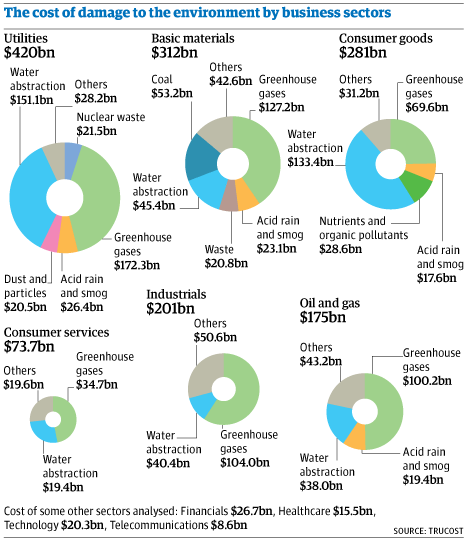The cost of corporate ecocide is greater than the national economies of all but seven countries …
+++++++++++++
by Juliette Jowit
Guardian, Feb. 18, 2010
The cost of pollution and other damage to the natural environment caused by the world’s biggest companies would wipe out more than one-third of their profits if they were held financially accountable, a major unpublished study for the United Nations has found
The report comes amid growing concern that no one is made to pay for most of the use, loss and damage of the environment, which is reaching crisis proportions in the form of pollution and the rapid loss of freshwater, fisheries and fertile soils.
Later this year, another huge UN study – dubbed the “Stern for nature” after the influential report on the economics of climate change by Sir Nicholas Stern – will attempt to put a price on such global environmental damage, and suggest ways to prevent it. The report, led by economist Pavan Sukhdev, is likely to argue for abolition of billions of dollars of subsidies to harmful industries like agriculture, energy and transport, tougher regulations and more taxes on companies that cause the damage.
Ahead of changes which would have a profound effect – not just on companies’ profits but also their customers and pension funds and other investors – the UN-backed Principles for Responsible Investment initiative and the United Nations Environment Programme jointly ordered a report into the activities of the 3,000 biggest public companies in the world, which includes household names from the UK’s FTSE 100 and other major stockmarkets.
The study, conducted by London-based consultancy Trucost and due to be published this summer, found the estimated combined damage was worth US$2.2 trillion (£1.4tn) in 2008 – a figure bigger than the national economies of all but seven countries in the world that year.
The figure equates to 6-7% of the companies’ combined turnover, or an average of one-third of their profits, though some businesses would be much harder hit than others.
“What we’re talking about is a completely new paradigm,” said Richard Mattison, Trucost’s chief operating officer and leader of the report team. “Externalities of this scale and nature pose a major risk to the global economy and markets are not fully aware of these risks, nor do they know how to deal with them.”
The biggest single impact on the $2.2tn estimate, accounting for more than half of the total, was emissions of greenhouse gases blamed for climate change. Other major “costs” were local air pollution such as particulates, and the damage caused by the over-use and pollution of freshwater.
The true figure is likely to be even higher because the $2.2tn does not include damage caused by household and government consumption of goods and services, such as energy used to power appliances or waste; the “social impacts” such as the migration of people driven out of affected areas, or the long-term effects of any damage other than that from climate change. The final report will also include a higher total estimate which includes those long-term effects of problems such as toxic waste.
Trucost did not want to comment before the final report on which sectors incurred the highest “costs” of environmental damage, but they are likely to include power companies and heavy energy users like aluminium producers because of the greenhouse gases that result from burning fossil fuels. Heavy water users like food, drink and clothing companies are also likely to feature high up on the list.
Sukhdev said the heads of the major companies at this year’s annual economic summit in Davos, Switzerland, were increasingly concerned about the impact on their business if they were stopped or forced to pay for the damage.
“It can make the difference between profit and loss,” Sukhdev told the annual Earthwatch Oxford lecture last week. “That sense of foreboding is there with many, many [chief executives], and that potential is a good thing because it leads to solutions.”
The aim of the study is to encourage and help investors lobby companies to reduce their environmental impact before concerned governments act to restrict them through taxes or regulations, said Mattison.
“It’s going to be a significant proportion of a lot of companies’ profit margins,” Mattison told the Guardian. “Whether they actually have to pay for these costs will be determined by the appetite for policy makers to enforce the ‘polluter pays’ principle. We should be seeking ways to fix the system, rather than waiting for the economy to adapt. Continued inefficient use of natural resources will cause significant impacts on [national economies] overall, and a massive problem for governments to fix.”
Another major concern is the risk that companies simply run out of resources they need to operate, said Andrea Moffat, of the US-based investor lobby group Ceres, whose members include more than 80 funds with assets worth more than US$8tn. An example was the estimated loss of 20,000 jobs and $1bn last year for agricultural companies because of water shortages in California, said Moffat.




Find companies across the globe that operate in an eco-friendly manner, show how “going green” has not led to their collapse but rather influenced their business in a positive way, and show-case them on a large scale.Use advertizing to make these success stories known to a wide audience….and watch the culprits follow their lead…
“Sukhdev said the heads of the major companies at this year’s annual economic summit in Davos, Switzerland, were increasingly concerned about the impact on their business if they were stopped or forced to pay for the damage.”
Heaven forbid that they would have to pay for the environmental damage that they cause. Not polluting at all is obviously an alternative that is beyond grasp of most people’s (and thus CEOs) imagination.
We’re all going to be up against it clearly. Getting companies to account for externalities – and us to be able to pay for them.
Can’t see how governments will make either happen…and be reelected….